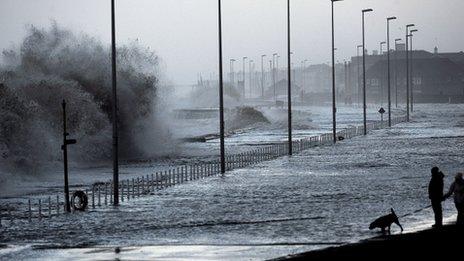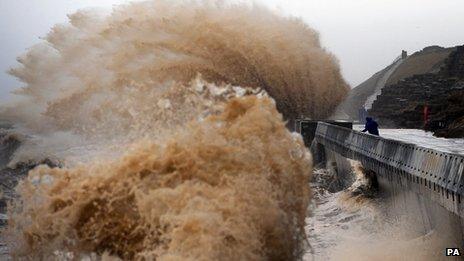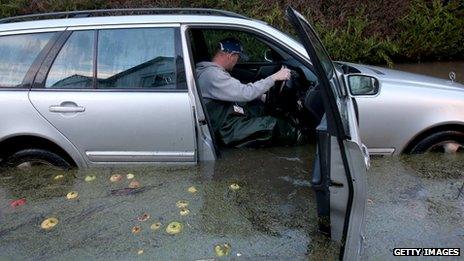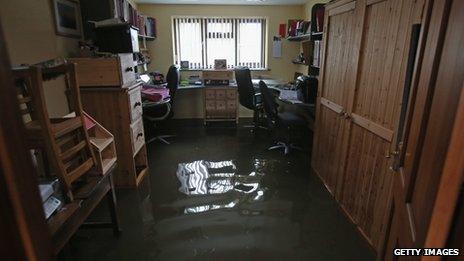MPs concerned over environment budget cuts
- Published
BBC science editor David Shukman : ''The barrage of bad weather...is highly unusual''
Substantial cuts to the government's environment department budget will hamper its future ability to cope with emergencies such as flooding, MPs fear.
They called on Environment Secretary Owen Paterson to clarify which policy areas faced the biggest cuts.
Mr Paterson has said resources will be shifted to respond to changing needs.
The Department for the Environment, Food and Rural Affairs (Defra) budget has been cut by £500m since 2010 and must find £300m in savings by 2016.
Defra spent just under £2.5bn during 2012-13, the Environment, Food and Rural Affairs (Efra) Select Committee said in its annual report on the department. , external
The department oversees a network of 28 agencies - including the Environment Agency and the Food and Environment Research Agency (Fera) - that delivers its policies.
George Eustice MP: Britain to see 'record levels' of flood defence spending
Efra Select Committee chairwoman and Conservative MP Ann McIntosh said: "Ministers must clarify how further budget cuts of [more than] £300m over the coming two years will impact on the funding provided to these agencies and the ability of the department to respond to emergencies."
She called for the government to consider using local engineers and private sector finance, such as from water companies, to cover the cost of other projects.
Last week, the Environment Agency announced that it was going to cut about 1,500 jobs by October as part of its ongoing efforts to reduce costs.
'Strong as ever'
Responding to reports that more than 500 of the possible post closures would be within the agency's flood prevention and protection teams, the Prospect union called on the government to review the planned job losses.
Prospect deputy secretary general Leslie Manasseh said: "They need to learn the lessons of the experiences of this winter, which have had such a devastating impact on so many people."
Mr Paterson responded by saying that he had been assured that frontline services would be protected, and promised to protect £370m for new flood defences.
Environment minister George Eustice told the BBC that Defra had prioritised spending on flood defences in the face of budget cuts across government.
"We are going to spend about £2.3bn up to 2021, which will be an increase in real terms so we are committed to constantly improving our defence infrastructure when it comes to flooding.
He added that existing defences had made a "really important contribution to protecting properties".
Maria Eagle, Labour's shadow environment secretary, accused Mr Paterson and his ministerial team of failing to prioritise investment in flood defences despite evidence that extreme weather conditions were set to become more frequent.
Speaking in the Commons on Monday, she also said he had failed to explain how communities at risk from flooding would be adversely impacted by "major reductions" in Environment Agency staff.
Severe and sustained flooding has affected many parts of the UK in recent weeks.

High tides and huge waves have contributed to the flooding

Coastal and inland defence have been struggling to hold back the water

The floods have caused widespread damage and disruption

Many homes, including this one in Muchelney, Somerset, have been flooded
The environment secretary said on Monday that seven people had died and 1,700 homes had been flooded in England alone due to storms and flooding in December and January.
Thousands of homes have suffered power cuts since strong winds and heavy rain began before Christmas.
The Met Office said last month was the windiest December in the UK since 1969 and of any month since January 1993, while the Environment Agency said recent storm surges were the highest since 1953.
The Efra Select Committee report also said the department faced a number of other high-profile emergencies during the past parliamentary year.
These included the outbreak of ash dieback in the wider environment and the horsemeat food contamination scandal.
The MPs observed that the allocation of resources to tackle these problems would be at the expense of other areas of policy.
They added that the forthcoming year was also shaping up to be another challenging one, with a range of issues on the agenda, including: its policy on badger culling to tackle TB in cattle; Common Agriculture Policy reforms; biodiversity offsetting; GM technology and flood defence funding.
- Published3 January 2014
- Published20 March 2013
- Published5 December 2013